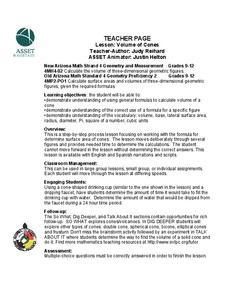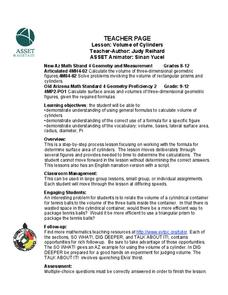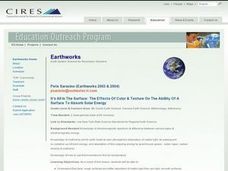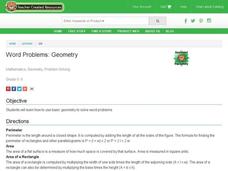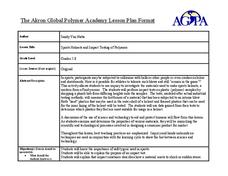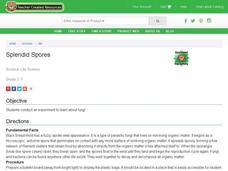Curated OER
Volume of Cones
Students identify the volume of cones and pyramids. In this geometry lesson, students derive the formula for cones and pyramids. They calculate the volume of cones and other three dimensional shapes.
Curated OER
Volume of Cylinders
Middle and high schoolers calculate the volume of cylinders. In this geometry lesson, learners differentiate between rectangular prisms and cylinders. They use the correct formula to solve for each solid.
Curated OER
Which Falls Faster?
Second graders study force and what it does. In this motion lesson students complete a demonstration on force and gravity and share their ideas.
Curated OER
It's All In The Surface: The Effects Of Color & Texture On The Ability Of A Surface To Absorb Solar Energy
Ninth graders examine how dark surfaces absorb more light than light surfaces. They perform an experiment that compares various surfaces abilities to absorb heat, then record and analyze the results.
Curated OER
Word Problems: Geometry
Students solve word problems by using basic geometry. In this geometry lesson, students use geometric formulas to find the perimeter, area, and volume of objects. Students complete a worksheet.
Curated OER
Why Is My Bread Fuzzy?
Students explore the organisms that live on counters or surfaces in the classroom. In this mold experiment, students observe mold in different conditons. Students record their observations on a worksheet. Students understand how mold...
Curated OER
Digging the Earth's Crust
Students investigate the Earth's crust. In this geology lesson, students identify the materials made up of the Earth's crust and investigate the different kinds of soil.
Curated OER
Putting the World in Perspective
Students work in small groups to: make a mental map of the world by tearing paper shapes of the seven continents and locating them on a flat surface in their relative positions, compare their finished mental map to a reference world map,...
Michigan Sea Grant
Environmental Decision Making
Pupils participate in a board game activity in which landing on a space called "Decision Card" presents them with a land-use situation to consider and decide how to act. In order to advance in Hydropoly, players must think critically and...
Curated OER
Collisions and Momentum: Bouncing Balls
Middle schoolers explore the concepts of potential and kinetic energy by bouncing assorted balls on different surfaces and calculating the momentum for each ball. They give examples of collisions and momentum in sports and understand...
Curated OER
Sports Helmets and Impact Testing of Polymers
Students examine the importance of good quality safety gear. In this investigative lesson, students will tests various polymers, collect data, and analyze the data to determine which polymer is best for safety helmets. They will design a...
Curated OER
History of the American West
Ninth graders research early mining in California. They study the "placer method" for mining gold, which is surface mining that does not involve tunneling. They examine what it was like for the early miners to pan for gold with...
Curated OER
Sea Ice Board Game
Students understand the sea ice cycle and can explain its stages. In this Sea Ice lesson, students play a game to identify types of sea ice. Students answer critical thinking questions about sea ice. Students complete a sea ice worksheet.
Curated OER
Flying Wing
Fifth graders create a flying wing from a pastry tray. In this flying wing lesson plan, 5th graders understand how the shape of the wind affects flight. Students compare the flying wing to the zanonia seed in nature. Students make...
Curated OER
Writing the Wind
Students make a windmill. In this wind lesson, students learn background information about the windmill, complete an activity where they create a windmill, discuss using wind as a natural resource and brainstorm other inventions that...
Curated OER
Particulate Matter- How Dirty is the Air We Breathe?
Fourth graders investigate air pollution. In this air pollution lesson plan, 4th graders test the air quality by using a block of wood and petroleum jelly. Students investigate the pollutants on the wooden block.
Curated OER
Wind
Students conduct an experiment. In this wind measurement instructional activity, students learn about instruments that measure the wind and then make a weather vane. Students record wind speed over a few days.
Curated OER
Splendid Spores
Students explore fungi. In this fungi lesson, students take a slice of bread and leave it outside for a day. Students record their observations of the fungi on the bread the following day.
Curated OER
Extreme Weather
Students examine different types of extreme weather and how to prepare for them. In this weather lesson plan students explore different types of extreme weather and create disaster preparation posters for different types of extreme weather.
Curated OER
Blue Planet: Tidal Seas
Students investigate how tides affect sea life. In this video based instructional activity, students view a video on how tides affect sea life. They do web-based research to find the answers to a series of questions and then play Tidal...
Curated OER
Glaciers and Icebergs
Students conduct an experiment on glacial scraping. In this glacial scraping lesson, students create a small glacier in a plastic cup. Students remove the cup and scrape the glacier across wood and note the markings. Students then make...
Teach Engineering
Stormy Skies
Young meteorologists examine the four main types of weather fronts and how they appear on a weather map. Participants learn about the difference between the types of weather fronts along with their distinguishing features. A...
Pennsylvania State University
Learn, Protect, and Promote Water
A hands-on activity helps learners explore the water cycle. After discussing how they use water, classes discuss water pollution and then move into a simulation where 20 pupils move through the water cycle based on description cards.
Teach Engineering
Projections and Coordinates: Turning a 3D Earth into Flatlands
Introduce your class to map projections and coordinates, the basics for the work done in a GIS, with an activity that uses Google Earth to challenge learners to think about the earth's shape.


